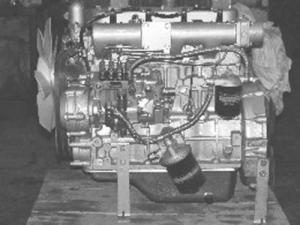2008 - Volume #32, Issue #3, Page #38
[ Sample Stories From This Issue | List of All Stories In This Issue | Print this story
| Read this issue]
He Specializes In Chinese Diesels
 |
"One customer told us he was using between 0.4 and 0.5 gal./hr. on his Imperial diesel versus 0.7 to 0.75 gal./hr. on his Yanmar. Both were on 12 K gensets," says Robert Shrock, Imperial Diesel. "If you can cut fuel use by a third, that's a considerable savings at today's fuel prices."
Shrock is sold on the Chinese diesels and even powers his business and his home with an Imperial Diesel genset. He filtered cooking oil in the home generators to keep the cost down.
He says the key to satisfaction with Chinese diesels, regardless of the fuel source, is in the prep they receive. He has been importing Chinese diesels to repower tractors and for use in gensets for more than 20 years. Although he carries a full line of parts, he has found minimal need for repairs once he learned to "Americanize" them.
"I only sell a couple of parts kits a year to past customers, and we have sold more than 2,000 diesels over the years," says Shrock.
Originally a Belarus tractor and engine dealer, Shrock learned that assembly was often not up to par, though manufacturing quality was fine. When Bellarus engines became difficult to import, Shrock started investigating Chinese diesels.
"My main goal was to supply a value priced product that had equivalent quality to American products," recalls Shrock. "I found factories that had good product and metallurgy, but they didn't pay as much detail to finished assembly."
He settled on Imperial Diesel Machinery, though they too needed quality control review. Americanizing the diesels meant prechecking heat torques and resetting the distance between the cam lobe and the valve stem. He would check all bolts, snugging down and tightening them to proper torque. He would even pull the oil pan and do a bottom up torque check.
"We got rid of most oil and coolant leaks this way," says Shrock. "Other importers were just marketing them the way they came. People would blow a head gasket or ruin bearings and cylinders, all because of a lack of initial prep."
Shrock says the quality control has improved measurably over the years. He no longer pulls the oil pan for a torque check. He also sees less and less need for other prep work. While he did see some water pumps go out after 1,500 to 2,000 hours, that is no longer the case.
"We remachined the housing and put in premium bearings and seals," says Shrock. "We don't have that problem anymore, but we do repair water pumps on other makes.
A big advantage with the Chinese diesels over U.S. brands such as Deere, which Shrock also services, is common parts. "A lot of parts such as filters, bearings and seals are common between manufacturers.
The one problem that still exists with Chinese diesels is meeting federal emissions mandates. Because they aren't certified, they can no longer be used to repower tractors and other self-propelled equipment. Shrock says they can be sold for gensets, irrigation pumps and other stationary uses for a few more years.
Contact: FARM SHOW Followup, Imperial Diesel Machinery, 8569 Ward North Rd., Kinsman, Ohio 44428 (ph 330 876-8709).

Click here to download page story appeared in.

Click here to read entire issue
To read the rest of this story, download this issue below or click here to register with your account number.




